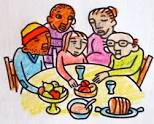Reflection: "Guess Who SHOULD be Coming to Dinner"In the 1967 film “Guess Who’s Coming to Dinner” with Sydney Poitier, Spencer Tracey & Katharine Hepburn, a middle class white American family is introduced to their daughter’s African American fiancé, when she asks him to come for dinner. In those years, inter-racial marriage was illegal.
It’s amazing to think how attitudes to race and colour (in some parts of the US & the world) have mellowed in just one generation, yet in other areas, as we hear in the news, racial tensions are still running high. For something that should be a joyous celebration, most of us know that wedding feasts can easily become minefields. How to seat the guests for the wedding meal is one of the toughest minefields to negotiate. After getting through the difficulties of who to leave off the invitation list, there’s the problem of where to seat them, who doesn’t get on with whom, etc. In Jesus’ day, a wedding feast was a big community event and it was a big issue to make sure that the seating order reflected their pecking order in the community. What a dishonour it would be to not have your proper place at the table, or be asked to take a seat lower down the scale than you expected. Even those without a seat at the table would be outside looking in to see who would be in the top seat. When it comes to dinner parties, Jesus is not exactly a June Dally Watkins, but it’s not because he didn’t get enough practice. Jesus and his disciples seem to eat their way through the Gospels. They go from place to place, house to house, one meal after another. Most of us can’t imagine what it would be like, not knowing where our next meal will come from. Of course, Jesus would not have worried too much, as he trusted his father to provide for him. Considering this, it’s surprising that Jesus would agree to eat at the house of a Pharisee. They publicly criticized Jesus for blasphemy (because he forgave sins), for uncleanness (because he ate with sinners), and for working on the Sabbath (because he cured the crippled lady, his disciples plucked grain from a field, etc). In Luke’s story, as the dinner begins, the Pharisees are watching Jesus carefully. If we were invited to such a do, we’d probably be on our best behaviour - careful not to talk with food in our mouth, or put our elbows on the table. As we might imagine it, the table is magnificent, the crystal chandelier shining, the servants attentive, the centrepiece impressive, and the champagne chilled. All the “right people” are there - bankers, doctors, lawyers and preachers. Jesus is invited not because he is considered an equal, but because he’s a curiosity who’s been in the news. The esteemed guests are watching closely to see how Jesus fits in. Oddly, Jesus decides he needs to offend the guests. This scene becomes a lesson in how to lose friends and alienate people. Jesus has noticed how the Pharisees are always looking for ways to move up the social ladder - or up the table order, on this occasion. He’s seen how they always try to sit at the place of honour. You may have been in one of those awkward situations yourself, when you’ve been a guest in someone’s home. You stand before the dinner table, not sure where to sit. Most of us wouldn’t take a place at the top of the table, the seat of honour, unless, of course, the host invites us to do so. This kind of common sense would seem to be what Jesus is suggesting, but it’s more than that. Jesus criticizes the guests for striving for status. When someone invites you to dinner, you take the place of honour. Then when somebody more important than you shows up, you’re red-faced as you’re asked to make your way to the last place - the only place left. You might as well go and sit there when you first arrive, for the host might then say, ‘Come and sit up here with me.’ When Jesus finishes insulting the guests, he begins to insult the host about who was included and who didn’t make the list: “The next time you put on a dinner party, don’t just invite your friends, family, and those you’re trying to impress - the kind of people who’ll return the favour. Invite people who don’t have similar interests, who never get invited out - the misfits from the wrong side of the tracks, the least of our sisters and brothers, the poorest of the poor. They won’t be able to return the favour, but God will know what you’ve done.” The disciples pull Jesus to the side and say, “You might want to back off a little. First you went after the seating protocol, and as if that wasn’t rude enough, now you’ve gone after the guest list. Our host is an influential person and he could do good things for us. All you have to do is act friendly and keep your elbows off the table. We won’t have any more dinner invitations if you can’t get through the appetizers without infuriating the person who invited us.” Why does Jesus have to stir up trouble? Why does he criticize people who invite him into their homes? Why can’t Jesus leave a pleasant enough dinner party well enough alone? It’s because Jesus understands what’s at stake. We have to learn that at God’s table there’s no need to jockey for position, because all are equally welcome. There are no throwaways when it comes to human beings. Christians are to honour the least among us - the poor and the marginalized. While the Pharisees were striving to move toward the head of a rectangular table, the table of Jesus is a round one, where no person is better than another. The character of our guest list - who is on it and who isn’t - has everything to do with whether, or not, we’re being Christ’s church. The followers of Christ have learned that any table where Jesus is present is a table where everyone is welcome. A foretaste of the heavenly banquet, foreshadowing the kingdom where God cares for all. This parable by Jesus is told to encourage them, and us, to be happy to take the lowest place – as Jesus did when he came to our earth. But then he comes up with this crazy idea of inviting the poor, the crippled, the lame and the blind. He’s turning on its head the whole scheme of dinners, where you invite the most important, so that you might become more important. Jesus says that you will be most blessed when you welcome those most in need, not looking for anything in return. Jesus wants us to reflect on how large God’s table is. It’s large enough to welcome those we don’t agree with, or don’t even like. It’s large enough to welcome the respectable and the disreputable. It’s large enough to welcome people from every nation, every language, every colour, without any special seats. It has to be that large if it’s big enough to welcome even us! The writer of Hebrews also exhorts us to show compassion and hospitality to those we meet, as by doing so, we might be entertaining hidden angels without actually knowing it. He reminds us that we can do all things with confidence, because God will never leave us or forsake us. So, the next time you’re planning a large dinner party, look not to who you can invite (in order to advance your social standing), but instead, to who is in most need of your love and care. God will look after you and these sacrifices will definitely be pleasing to him. Pastor Rick
1 Comment
Lena Beryl Blok
27/8/2022 07:11:52 am
Hi Rick, I like this message. thank you.
Reply
Your comment will be posted after it is approved.
Leave a Reply. |
Pastor
|
LANE COVE
|
Worship Service:9:30am Sunday
© Lane Cove Uniting Church | 2020
|



 RSS Feed
RSS Feed